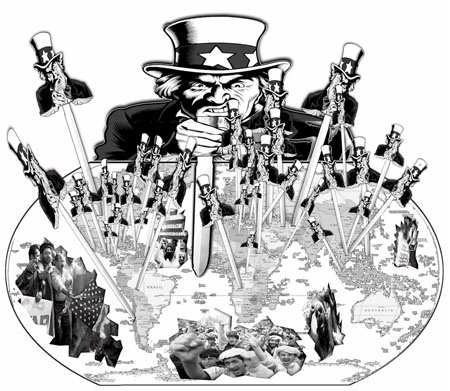By Dr. Binoy Kampmark
Farewell to the British, as they leave the country that took their soldiers, and more than a sense of dignity. Forces are being withdraw (the popular term is drawn down, as if they were blinds) and it is hard to see the mission in Afghanistan as anything but another intervention that did not quite pan out well for the invader. At one point, 137 bases dotted Helmand province. In an operational sense, only two bases remain: Camp Bastion, the main base for UK personnel, and Observation Post Sterga 2. Lashkar Gah and Patrol Base Lashkar Gah Durai now find themselves in Afghan control, while MOB Price in southern Helmand province has been closed.
In the age of clumsy American hegemony, it is easy to forget that Britain has been involved in more wars than most countries, showing an insatiable appetite for meddling. Authors such as Philip Towle in his Going to War (2009) have pointed out how Britain’s culture has been one of interference, featuring noisy debates about whether one military action or the other could be justified. He rightly notes that the election of Tony Blair’s government in 1997 saw the adoption of the most interventionist stance by a Britain since the Boer War.
Even now, the language used by the UK Defence Secretary, Philip Hammond, is one of distant interference for local interests. “Those service personnel who have served in Lashkar Gah and Lashkar Gah Durai and at MOB Price as part of successive UK brigades have made a huge contribution to the campaign which has safeguarded our national security at home” (PakTribune, Mar 18). This certainly stretches the idea of the national interest, but few were noticing.
The years of involvement of the British forces in Afghanistan, and to this can be added Iraq, revealed a series of failings that were imperfectly dealt with. Despite priding themselves on the art of counter-insurgency, British forces were found wanting. Their rotation policy was criticised. The battalion strengths were down. In January 2009, The Economist would argue that, “British forces are overstretched and have struggled to adapt to modern counter-insurgency campaigns.” And, just to add a stinging note, “The country’s most important allies, the Americans, are questioning Britain’s commitment and military performance.”
The latter point is particularly bruising, given the deep desire by British governments to keep company with their American counterparts in disastrous military missions. There is no shame in allowing Washington to bloody its imperial boots alone, but the very idea of allowing the US forces to wage war in single company was too much to stomach. Damn it, if Uncle Sam is spreading the good word through missile and faux humanitarianism, Britain should at least have a stake in how it could be done.
Throughout the campaign, the cloying language of humanitarianism couched military efforts. We live in an age of the protective principle, that ghastly expression of insincerity which masks violence. The Afghan people became the infants and adolescents of the enterprise. The language of the coalition presence was that of the powerful and noble helping the cripplingly weak. There can be no genuine sense of independence where inequality, both actual and imagined, is so acute.
It has therefore been imperative to praise the ability of the inept Afghan forces to assume command and take the battle to the Taliban. Most expect they will be outmatched and, eventually, outdone. What has been put in place will be torn up and torn down. Military officialdom is, however, keen to give a different picture. The invaders are still attempting to shape the narrative. For Britain’s Defence Secretary Philip Hammond, “The handover and closure of our bases across Helmand underlines the progress UK forces have made to increase security and stability across the province but also to build up the capability of the Afghan forces who will carry that work forward” (PakTribune, Mar 18).
The military enthusiasts would be rather peeved at the idea that the British forces are leaving Afghanistan as “combat ready”, a reversal of uses if ever there was one. Conventional wisdom dictates that a military force, in taking to battle, should be well equipped to begin with. As a report on the BBC (Jan 20) by the defence correspondent Jonathan Beale asserted, “It’s still unclear as to what they’ll have achieved, but one thing is certain – they leave much better equipped than when they first arrived.” The war satirists will be getting their scripts ready.
Through the Middle Eastern campaigns, the penny pinchers were operating, keen to keep Britain in war, but distinctly under-resourced. The recession was biting, the financial crisis cutting – but war was, well, war. The British soldier might well be able to stand up to anything – or so claimed George Bernard Shaw – “except the British War Office.” Bureaucrats at home wielding pen and signatures over budgets, and the Taliban in the battlefield saw Britain’s soldiers squeezed with merciless enthusiasm. Expensive military kit was being consistently overlooked in favour of the big killer toys, none of which were of particular use in Afghanistan. A submarine might thrill the nobs of White Hall, but it rarely gets you far in the desert.
Brigadier James Woodham, Commander Task Force Helmand, sees the handover as “a historic moment in the UK’s military campaign in Afghanistan.” In truth, it is merely another historical addition to the annals an Afghan incursion that lasted too long and cost too much. Afghanistan remains a siren for empires, calling them, then consuming their resources. Of all the forces, Britain should have known that the best. The dead from Major General Elphinstone’s Kabul retreat of 1842 were not consulted, let alone heeded.
Dr. Binoy Kampmark was a Commonwealth Scholar at Selwyn College, Cambridge. He lectures at RMIT University, Melbourne.




